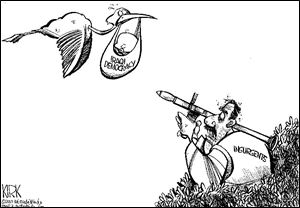
The Harvard harangue
1/23/2005
Lawrence Summers has done it again. Only this time the blunt Harvard University president took on the wrong constituency. Early in his tenure, the former Treasury secretary under Bill Clinton angered black professors by questioning the academic output of one of the Ivy League s star academics who left for greener pastures.
But just recently he managed to insult an entire gender at a conference on women and minorities in science and engineering. In addressing the scarcity of women in math and science careers, the esteemed speaker suggested that perhaps women lack the same natural ability to excel in those fields as men.
Those listening to the Ivy League chief ruminate about why there are few women at the top levels of science and engineering were stunned. The message many in his female audience took from his remarks was that women did not possess the same innate aptitude in the sciences as their male colleagues who generally outperformed them on senior high school math and science tests.
According to participants in the off-the-record conference, President Summers also explored the reluctance or inability of women to work the hours required to advance in rigorous fields of discipline. Possible discrimination was broached as another reason women might not be found at the highest levels of math and science.
Nancy Hopkins, a biology professor at the Massachusetts Institute of Technology, was so disturbed by Mr. Summers speculation that she walked out of the talk. Others were deeply offended.
Some, like Cynthia Friend, who for 20 years was the only female in Harvard s department of chemistry and chemical biology before becoming its chairwoman, said the problem with the president s comments is you can t take them back.
Though he has tried. In multiple mea culpas, Mr. Summers acknowledged I was wrong to have spoken in a way that has resulted in an unintended signal of discouragement to talented girls and women.
A group of Harvard professors told the president his remarks hurt the institution. Indeed, they serve to reinforce an institutional culture at Harvard that erects numerous barriers to improving the representation of women on the faculty, and to impede our current efforts to recruit top women scholars.
But the continuing furor over the president s sexist insinuations has had at least one positive effect. Mr. Summers is apparently a changed man after receiving numerous e-mails and telephone calls that made vivid the very real barriers faced by women in pursuing scientific and other academic careers.
The newly enlightened president even acknowledged how frustratingly uneven and slow progress has been in luring more women to the sciences. We ll consider his comment a step in the right direction.